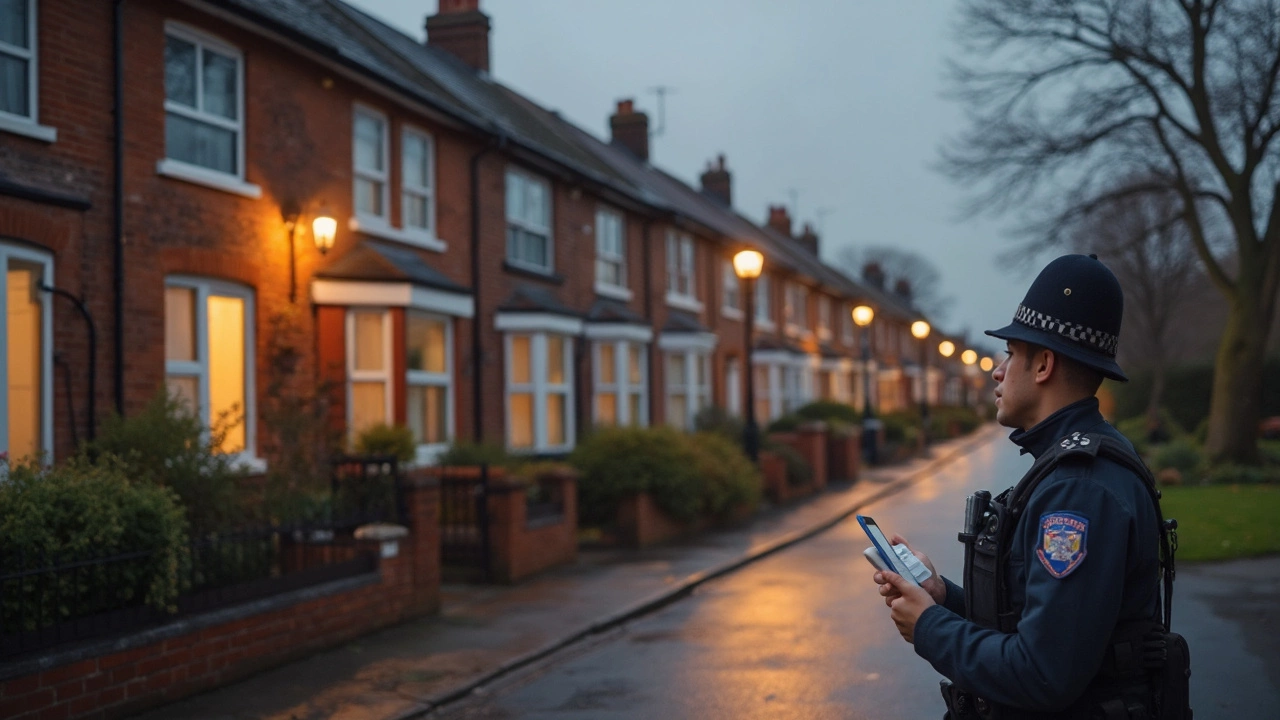Ever walked by a house and noticed a little glowing eye staring back at you? That's probably a Ring doorbell, standing guard and capturing whatever goes on near the front door. Neat, huh? But what if one day, someone in a uniform asks to see what your doorbell saw? Yup, we're talking about the police and how they might want a peek at that footage.
In the UK, Ring doorbells have become quite the hot-ticket item. People love the extra layer of security, not to mention catching the latest antics of courier deliveries. But here's the scoop: even though you might have invested in that doorbell, there's a question lingering like a rainy day—can cops actually see what's recorded on it?
We'll take a look at what’s legally cool and what’s not when it comes to handing over your eye-in-the-sky footage. It's not about being anti-law enforcement; it's about knowing where you stand. After all, understanding your privacy rights helps you reach for that comforting cuppa without added stress.
- Understanding Your Privacy Rights
- When Police Can Request Footage
- What Happens If You Refuse
- Smart Tips for Homeowners
Understanding Your Privacy Rights
So, let's chat about what your rights actually are when it comes to your Ring doorbell footage in the UK. Owning one gives you eyes on your front doorstep, but it also comes with a set of privacy laws you need to know.
First things first, your Ring doorbell captures video, and that counts as data. Under UK law, more specifically the Data Protection Act 2018, you are the data controller of this information. This means you're responsible for what happens to that sweet footage your doorbell snaps.
Legal Framework
If your doorbell records anything beyond your property line—like a piece of the street or your neighbor's garden—you might find yourself tangled in data protection rules. This doesn’t mean you need to panic, but you should be aware that you're required to respect the privacy of others caught in the video. Individuals do have rights under GDPR to access data that relates to them.
Requests from the Police
Now, about those police requests for access. Here's the deal: they can ask to see your footage, especially if it's potentially related to a crime. However, you aren't legally obligated to hand it over, unless they have a court order or a warrant. Imagine it like them knocking on your door asking to come in—without that legal document, it’s still your decision.
The Met Police, for example, might reach out in neighborhoods during investigations where doorbell cams could have captured critical info. While they can be persuasive, they understand these legal boundaries, too.
Data and Stats
Curious about how frequent these requests are? Here's a glimpse into some data that might surprise you:
| Year | Requests in London |
|---|---|
| 2022 | Approximately 2,500 |
| 2023 | Almost 2,800 |
As you can see, the requests are on the rise with more people installing these smart gadgets. So, the takeaway? Know where you stand and don't be afraid to ask questions if you ever find yourself facing one of those requests.
When Police Can Request Footage
So, you’ve got your Ring doorbell set up, and suddenly the bobbies are knocking, asking for a little peeksy at the footage. What are your rights here, then?
First off, in the UK, police have a few avenues to ask for your doorbell video. Typically, it comes down to one of two things: either they politely request your cooperation, or they knock (figuratively or literally) with a court order.
Police Request
Imagine this: The local constabulary is investigating a swiped delivery or something dodgier, and they've realised your smart doorbell might hold some clues. They could pop over and simply ask if you're willing to share the footage. Here's where you have a choice. You're not obligated to say yes, but, on the flip side, helping solve neighborhood mysteries could be worth the trouble.
If you're unsure, you’ve got every right to ask for more details about the nature of the investigation and how your footage plays a part.
Legal Mandate
Now, if the bobbies are serious, they could come armed with something more official—a court order, or as it’s also known, a production order. This isn't just a piece of paper they hand over willy-nilly. It's issued when there’s probable cause, and it gives the police legal grounds to obtain the footage.
Are you obliged to comply? Absolutely. A court order is not a suggestion; it's a legally binding document.
Let’s break it down further:
- Production Orders: Used in serious investigations. Police must demonstrate necessity and relevance of the footage.
- Voluntary Requests: More informal. You can decide to help out, but it's nice to know you’re not legally required without a court order.
Keen to help, or prefer keeping footage to yourself? Each choice has a ripple effect, so it’s worth a ponder. Generally, keeping the peace with a balance between being a good citizen and a privacy-savvy individual seems reasonable.

What Happens If You Refuse
So, a police officer shows up, curious about your Ring doorbell footage, and you’re feeling hesitant to hand it over. What next? It’s your right to refuse, but let’s unpack what that might look like.
First off, the police can’t make you show them the footage without either a warrant or your permission. If you choose to decline, an officer might explain why they need it and how it could help in their investigation. But ultimately, they can’t force you to do anything in the moment.
A Possible Warrant
If the police believe your footage is essential for a case, they might get a court order to obtain it. A judge will look at whether the footage is necessary and relevant. This step protects your rights while ensuring the legal process is followed.
Neighborhood Considerations
Refusing might feel awkward, especially if it involves a neighborhood incident. Conversations with neighbors could pop up, with each person having different views on cooperating with law enforcement. It’s always good to know where you stand and to respect others' choices.
Staying on Good Terms
No one wants to fall out with the community or local law enforcement. If you refuse, doing so respectfully and explaining your concerns can help. After all, everyone’s trying to do what’s best with their own understanding of the situation.
Smart Tips for Homeowners
Living in the age of technology means we get some pretty nifty gadgets like the Ring doorbell. If you're making that investment, here are some practical tips to make the most out of your smart doorbell while keeping your privacy in check.
Secure Your Account
The first rule of thumb is securing your Ring account; it’s not rocket science, but it sure is important. Use a strong password, something complex that isn't 'password123'. Consider activating two-factor authentication for extra security. Nothing keeps prying eyes out better than a good ol' double check.
Know How to Share Footage
If the police access comes knocking, remember you're in control. You can choose to manually share footage or deny the request. Ring usually informs you before disclosing any of your data, so stay alert for those notifications.
Customize Privacy Settings
Ring doorbells come with handy privacy settings. You can limit recording to certain zones or times, and even turn off audio recording completely. Tinkering with these settings not only prevents unnecessary data recording but also keeps neighbors happy, avoiding the 'Big Brother' feel.
Stay Updated
Regular updates are golden—give your Ring software a refresh when prompted. Those updates don’t just add features; they beef up security too. Keep an eye on updates in the app and install them whenever they pop up.
Community Tips and Data
Consider joining the Ring Community. It's a treasure trove of user tips and real-life experiences. According to a recent data table from Ring’s user stats:
| Feature | Usage Increase (%) |
|---|---|
| Custom Zones | 45% |
| Audio Off | 35% |
This shows how folks all over are learning to balance tech utility with personal privacy.
Being a savvy smart doorbell user isn't just about knowing how it operates but also understanding how it fits into your life seamlessly without any hitches.

